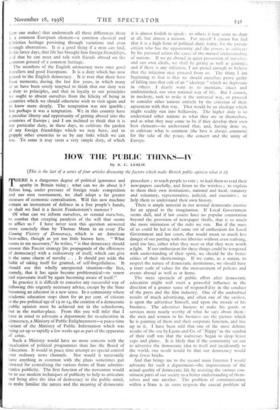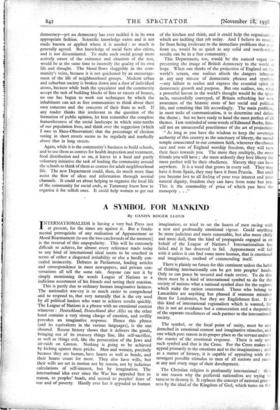HOW THE PUBLIC THINKS IV
By S. C. LESLIE [This is the last of a series of four articles discussing the factors which make British public opinion what it is] THERE is a dangerous degree of political ignorance and apathy in Britain today ; what can we do about it ? Before long, under pressure of foreign trade competition and our own rearmament, we shall adopt a far greater measure of economic centralisation. Will this new machine remain an instrument of defence in a free people's hands, or shall we find it a fascist Frankenstein's monster ?
Of what can we inform ourselves, or remind ourselves, to combat that creeping paralysis of the will that seems to afflict us ? I have never seen this question answered more concisely than by Thomas Mann in an essay The Coming Victory of Democracy, which is an American best-seller, though as yet too little known here. " What seems to me necessary," he writes, " is that democracy should answer this Fascist strategy [its propaganda of the effeteness of democracy] with a rediscovery of itself, which can give it the same charm of novelty . . . It should put aside the habit of taking itself for granted, of self-forgetfulness. It should use this wholly unexpected situation—the fact, namely, that it has again become problematical—to renew and rejuvenate itself by again becoming aware of itself."
In practice it is difficult to conceive any successful way of following this urgently necessary advice, except by the State becoming an educator in a new sense. In a community where academic education stops short for 90 per cent. of citizens at the pre-political age of 13 or 14, the creation of a democratic public opinion must be achieved not in the schoolroom, but in the market-place. From this you will infer that I have in mind to advocate a department for re-education in democracy, a Ministry of Public Enlightenment—a peace-time variant of the Ministry of Public Information which was being set up so rapidly a few weeks ago as part of the apparatus of crisis.
Such a Ministry would have no more concern with the inculcation of political programmes than has the Board of Education. It would in peace time attempt no special control over ordinary news channels. Nor would it necessarily have anything in common with the plans sometimes put :orward for centralising the various forms of State adminis- trative publicity. The first function of the newcomer would be to use modem techniques of publicity to help to articulate and bring alive the idea of democracy in the public mind, to make familiar the nature and the meaning of democratic procedure ; to teach people to vote ; to lead them to read their newspapers carefully, and listen to the wireless ; to explain to them their own institutions, national and local, statutory and voluntary, representative, judicial, and executive ; to help them to understand their own history.
There is ample material in our normal democratic routine for an appeal to the imagination. If Local Government seems dull, and if law courts have no popular connotation beyond the provision of newspaper thrills, that is so much the more intimation of the risks we run. But if the mass of us could be led to feel some stir of enthusiasm for Local Government and law court, that would mean so much less danger of our parting with our liberties without even realising, until too late, either what they were or that they were worth a fight. If our enthusiasm for these things could be tempered with understanding of their spirit, we should be the better critics of their shortcomings. If we came, as a nation, to respect the nature of democratic institutions, we should have a truer scale of values for the measurement of policies and events abroad as well as at home.
The mere spectacle of public effort after democratic education might well exert a powerful influence in the direction of a greater sense of responsibility in the conduct of the press and the film industry. One of the undoubted results of much advertising, and often one of the earliest, is upon the advertiser himself, and upon the morale of his business. The advertiser hastens to make his goods or services more nearly worthy of what he says about them : the men and women in his business see the picture which he is painting of them and their corporate function, and live up to it. I have been told that one of the most definite results of the use by Lyons and Co. of ' Nippy ' as the symbol of their staff was that the waitresses began to drop fewer cups and plates. It is likely that if the community set out to advertise the democratic idea to itself and incidentally to the world, one result would be that our democracy would drop fewer bricks.
And that brings me to the second main function I would advocate for such a department—the improvement of the actual quality of democratic life by assisting the various con- stituent parts of our society to a better understanding of them- selves and one another. The problem of communication within a State is in some respects the crucial problem of democracy—yet no democracy has ever tackled it in its own appropriate fashion. Scientific knowledge exists and is not made known or applied where it is needed : so much is generally agreed. But knowledge of social facts also exists, and is not disseminated. To make each social group more actively aware of the existence and situation of the rest, would be at the same time to intensify the quality of its own life and thought. The blood flows sluggishly in the com- munity's veins, because it is not quickened by an encourage- ment of the life of neighbourhood groups. Modem urban and suburban society is broken down into a dust of individual atoms, because while both the speculator and the community accept the task of building blocks of flats or streets of houses, no one has begun to work out techniques by which the inhabitants can act as free communities to think about their own concerns and the concerns of their State as well. If any reader thinks this irrelevant to the question of the formation of public opinion, let him remember the complete featurelessness of the social landscape in which nine-tenths of our population lives, and think over the suggestion (which I owe to Mass-Observation) that the percentage of election voting in short streets seems to be regularly and markedly above that in long streets.
Again, while it is the community's business to build schools, and to use them as centres for health inspection and treatment, food distribution and so on, it leaves to a local and partly voluntary initiative the task of leading the community around the schools to think of them as centres for adult neighbourhood life. The new Department could, then, do much more than assist the flow of ideas and information through normal channels. It could set about helping to organise the local life of the community for social ends, as Tammany knew how to organise it for selfish ones. It could help women to get out of the kitchen and think, and it could help the Organisat: which are tackling that job today. And I believe its resu. far from being irrelevant to the immediate problems that ccr.- front us, would be as quick as any solid and worth-whih: results can be in a free community.
This Department, too, would be the natural organ for presenting the image of British democracy to the world at large. When one thinks of the projection of England on the world's screen, one realises afresh the dangers inherent in any easy misuse of democratic , phrases and symbol, —any failure to realise and express the essential spirit of democratic growth and purpose. But one realises, too, what a powerful leaven in the world's thought would be the spec- tacle, successfully conveyed, of Britain refreshing her own awareness of the historic' roots of her social and political life, and remaking that life accordingly. The main problem, in most tasks of communication, is to determine and define the theme ; but we have ready to hand the most *feet of all themes. I am reminded of some words of Edmund Burke, him- self not an unsuccessful practitioner of the art of projection : " As long as you have the wisdom to keep the sovereign authority of this country as the sanctuary of liberty, the sacred temple consecrated to our common faith, wherever the chosen race and sons of England worship freedom, they will turn their faces towards you. The more they multiply, the more friends you will have ; the more ardently they loVe liberty the more perfect will be their obedience. SlaverT they; can have anywhere. It is a weed that grows in every soil. They may have it from Spain, they may have it from Prussia.. But until you become lost to all feeling of your true inteiest and your natural dignity, freedom they can have from none but you. This is the commodity of price of which you have the monopoly . . ."

























































 Previous page
Previous page